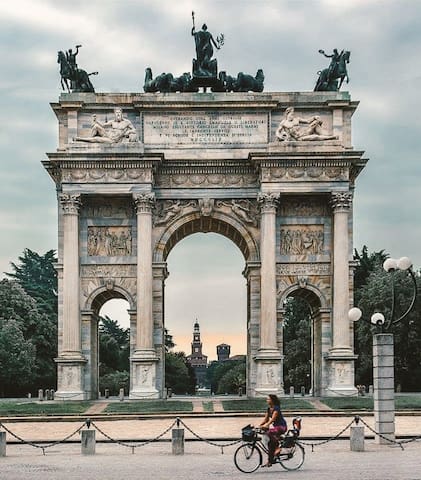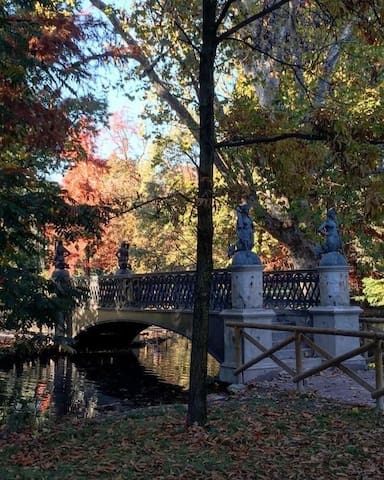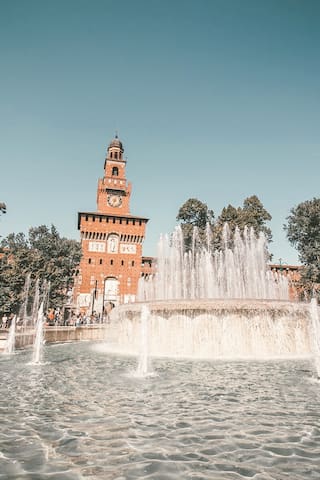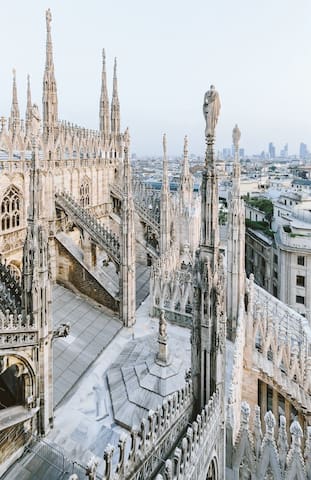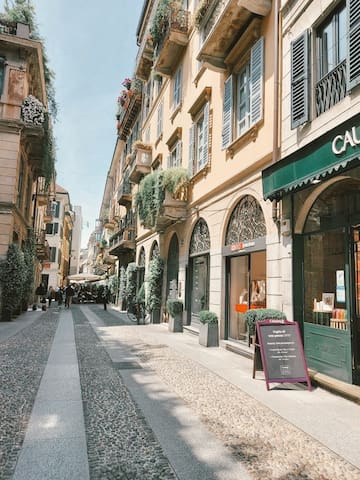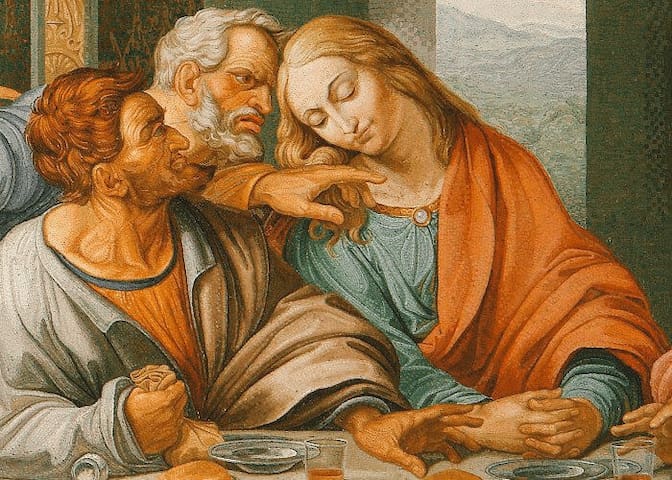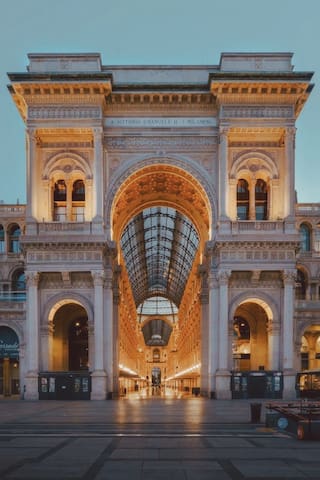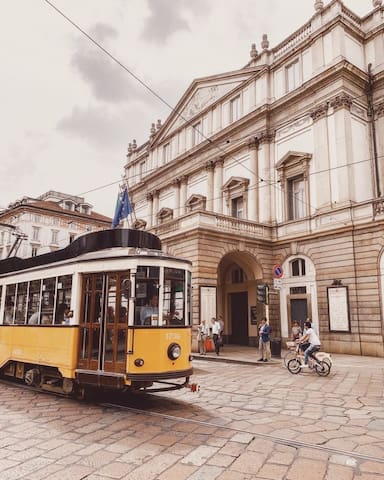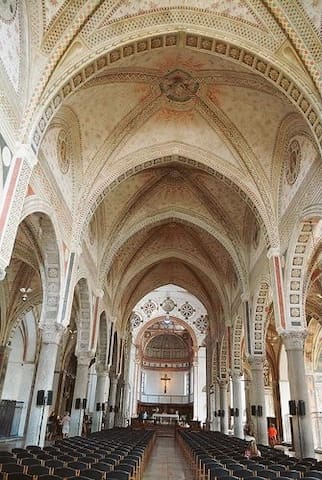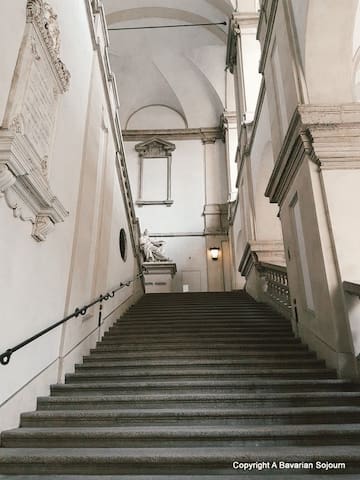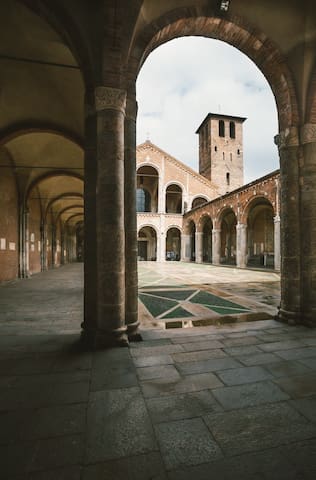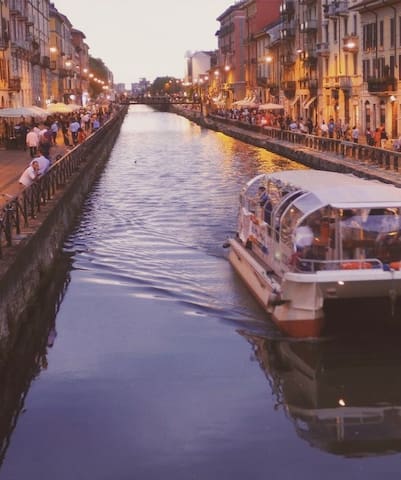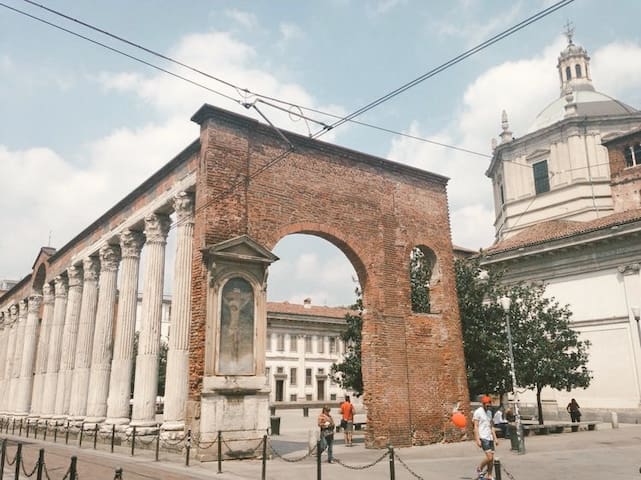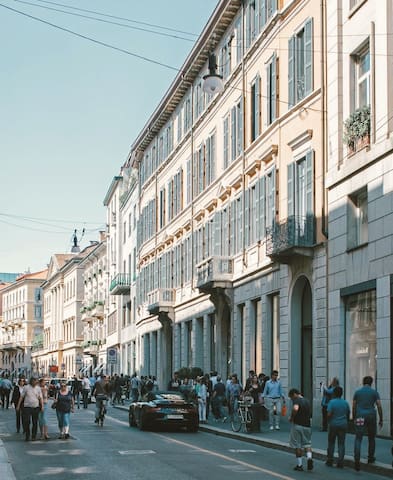Lugares emblemáticos
The Arch of Peace (Arco della Pace), located 5 minutes from the apartment and at the entrance to Park Sempione in Milan, is a neoclassical arch begun by Napoleon during the early 19th century to honor his military victories. Made of marble from the Swiss Alps, the triumphal arch marks the beginning of the road that connects Milan and Paris.
A favorite meeting spot by day, especially in summer, the area is also bustling with life when the sun goes down.
The arch is open all year round and is busiest during the summer months. Get there early in the morning for pictures without crowds, or come in the evening and enjoy the area’s vibrant nightlife scene after your visit.
Where to eat/drink:
🍹Living liqueurs&delights for an authentic Italian Aperitivo!
🍹🥐Duomo Sam 1952 for an aperitivo or breakfast!
353 ντόπιοι το προτείνουν
Αψίδα της Ειρήνης
Piazza SempioneThe Arch of Peace (Arco della Pace), located 5 minutes from the apartment and at the entrance to Park Sempione in Milan, is a neoclassical arch begun by Napoleon during the early 19th century to honor his military victories. Made of marble from the Swiss Alps, the triumphal arch marks the beginning of the road that connects Milan and Paris.
A favorite meeting spot by day, especially in summer, the area is also bustling with life when the sun goes down.
The arch is open all year round and is busiest during the summer months. Get there early in the morning for pictures without crowds, or come in the evening and enjoy the area’s vibrant nightlife scene after your visit.
Where to eat/drink:
🍹Living liqueurs&delights for an authentic Italian Aperitivo!
🍹🥐Duomo Sam 1952 for an aperitivo or breakfast!
Chic Milan is known for its contemporary elegance and relentless pace, so it may come as a surprise to learn that one of Italy’s loveliest city parks sits at its heart. Sempione Park (Parco Sempione) is located few steps away from the apartment, offering a welcome respite from the surrounding urban hustle and bustle.
Behind Sforza Castle (Castello Sforzesco) and adjacent to the fashionable Brera neighborhood, this public park was laid out in the late 1800s. The grounds include gravel paths, the triumphal Arch of Peace (Arco della Pace), a lake, and even the small Arena Civica used for concerts and sporting events. The park’s Torre Branca tower offers a bird’s-eye view of the entire city. Museums inside the park include the Triennale contemporary art and design museum in the Palazzo dell’Arte and the city’s small aquarium.
Where to eat/drink:
🍸Bar Bianco
🍝Cascina Nascosta
1487 ντόπιοι το προτείνουν
Πάρκο Sempione
Piazza SempioneChic Milan is known for its contemporary elegance and relentless pace, so it may come as a surprise to learn that one of Italy’s loveliest city parks sits at its heart. Sempione Park (Parco Sempione) is located few steps away from the apartment, offering a welcome respite from the surrounding urban hustle and bustle.
Behind Sforza Castle (Castello Sforzesco) and adjacent to the fashionable Brera neighborhood, this public park was laid out in the late 1800s. The grounds include gravel paths, the triumphal Arch of Peace (Arco della Pace), a lake, and even the small Arena Civica used for concerts and sporting events. The park’s Torre Branca tower offers a bird’s-eye view of the entire city. Museums inside the park include the Triennale contemporary art and design museum in the Palazzo dell’Arte and the city’s small aquarium.
Where to eat/drink:
🍸Bar Bianco
🍝Cascina Nascosta
Sforza Castle (Castello Sforzesco) is a medieval fortress built by the Visconti dynasty that became home to Milan’s ruling Sforza family in 1450. Stark and domineering, the historic brick castle has massive round battlements, an imposing tower overlooking the central courtyard and surrounding Parco Sempione gardens, and defensive walls designed by Leonardo da Vinci. Today the castle houses a number of world-class museums and galleries.
Lines can be long to enter its museums, so book a skip-the-line tour of this vast complex to avoid a delay at the entrance or join a walking tour of the city that includes stops at some of its most famous monuments and a visit to the castle. Certain parts of the castle, including the crenellated ramparts and the covered "Ghirlanda" passage, are only accessible by private tour.
1406 ντόπιοι το προτείνουν
Κάστρο Σφόρτσεσκο
Piazza CastelloSforza Castle (Castello Sforzesco) is a medieval fortress built by the Visconti dynasty that became home to Milan’s ruling Sforza family in 1450. Stark and domineering, the historic brick castle has massive round battlements, an imposing tower overlooking the central courtyard and surrounding Parco Sempione gardens, and defensive walls designed by Leonardo da Vinci. Today the castle houses a number of world-class museums and galleries.
Lines can be long to enter its museums, so book a skip-the-line tour of this vast complex to avoid a delay at the entrance or join a walking tour of the city that includes stops at some of its most famous monuments and a visit to the castle. Certain parts of the castle, including the crenellated ramparts and the covered "Ghirlanda" passage, are only accessible by private tour.
The most exuberant example of Northern Gothic architecture in Italy, the spiky spires and towers of Milan's Duomo (Duomo di Milano) dominate Piazza del Duomo, the city's beating heart. One of the highlights of a visit to the cathedral is the view from the roof, where you can scope out Milan from the highest terrace surrounded by statues. On a clear day, it’s possible to see the Italian Alps.
2114 ντόπιοι το προτείνουν
Καθεδρικός Ναός του Μιλάνου
Piazza del DuomoThe most exuberant example of Northern Gothic architecture in Italy, the spiky spires and towers of Milan's Duomo (Duomo di Milano) dominate Piazza del Duomo, the city's beating heart. One of the highlights of a visit to the cathedral is the view from the roof, where you can scope out Milan from the highest terrace surrounded by statues. On a clear day, it’s possible to see the Italian Alps.
Milan boasts a number of trendy neighborhoods thick with hip bars, restaurants, and clubs. Of these, the Brera district—a maze of narrow, cobblestone streets lined with boutiques and cafés near the Duomo in the city center—is perhaps the most beautiful thanks to its laid-back pace and old-world charm.
Brera is 20 minutes away walking from the apartment!
756 ντόπιοι το προτείνουν
Brera
Milan boasts a number of trendy neighborhoods thick with hip bars, restaurants, and clubs. Of these, the Brera district—a maze of narrow, cobblestone streets lined with boutiques and cafés near the Duomo in the city center—is perhaps the most beautiful thanks to its laid-back pace and old-world charm.
Brera is 20 minutes away walking from the apartment!
Each day, Leonardo da Vinci's The Last Supper (Il Cenacolo) draws hundreds of art-loving visitors to the unassuming refectory of the Church of Santa Maria delle Grazie for just 15 minutes with the painting. Arguably Milan's most famous 15th-century wall mural, you must book entrance tickets in advance or sign up for a guided Milan city tour to see it up close.
435 ντόπιοι το προτείνουν
Το Τελευταίο Βραδινό Τραπέζι
2 Piazza di Santa Maria delle GrazieEach day, Leonardo da Vinci's The Last Supper (Il Cenacolo) draws hundreds of art-loving visitors to the unassuming refectory of the Church of Santa Maria delle Grazie for just 15 minutes with the painting. Arguably Milan's most famous 15th-century wall mural, you must book entrance tickets in advance or sign up for a guided Milan city tour to see it up close.
In the fashion capital of Italy, the glass-domed Galleria Vittorio Emanuele II shopping arcade—one of the oldest in Europe—never goes out of style. Sandwiched by the Milan Duomo on one side and the Piazza di Marino on the other, Galleria Vittorio Emanuele II is a bright and airy 4-story center full of restaurants and shops. Come for the neoclassical architecture; stay for the brands and fresh baked panzerotti at Luini 🥟
423 ντόπιοι το προτείνουν
Γκαλερία Βιτόριο Εμανουέλε ΙΙ
Piazza del DuomoIn the fashion capital of Italy, the glass-domed Galleria Vittorio Emanuele II shopping arcade—one of the oldest in Europe—never goes out of style. Sandwiched by the Milan Duomo on one side and the Piazza di Marino on the other, Galleria Vittorio Emanuele II is a bright and airy 4-story center full of restaurants and shops. Come for the neoclassical architecture; stay for the brands and fresh baked panzerotti at Luini 🥟
La Scala Opera House (Teatro alla Scala), one of the world’s greatest opera houses, has hosted some of Italy’s most famous opera and other performances. Located in downtown Milan, this 18th-century theater and cultural landmark—magnificently restored in 2004—seats many of its 2,000 spectators in elegant boxes adorned with gold leaf and red velvet.
799 ντόπιοι το προτείνουν
Θέατρο Άλλα Σκάλα
2 Via FilodrammaticiLa Scala Opera House (Teatro alla Scala), one of the world’s greatest opera houses, has hosted some of Italy’s most famous opera and other performances. Located in downtown Milan, this 18th-century theater and cultural landmark—magnificently restored in 2004—seats many of its 2,000 spectators in elegant boxes adorned with gold leaf and red velvet.
Built by Duke Francesco I Sforza and later reworked by Bramante, the modest 15th-century Church of Santa Maria delle Grazie (Chiesa di Santa Maria delle Grazie) is known for housing one of Italy’s most celebrated works of Renaissance art—Leonardo da Vinci’s The Last Supper, which decorates the refectory wall of the adjoining Dominican convent.
581 ντόπιοι το προτείνουν
Σάντα Μαρία ντέλε Γκράτσιε
Piazza di Santa Maria delle GrazieBuilt by Duke Francesco I Sforza and later reworked by Bramante, the modest 15th-century Church of Santa Maria delle Grazie (Chiesa di Santa Maria delle Grazie) is known for housing one of Italy’s most celebrated works of Renaissance art—Leonardo da Vinci’s The Last Supper, which decorates the refectory wall of the adjoining Dominican convent.
The Brera Art Gallery (Pinacoteca di Brera), one of Italy’s most important museums, is a highlight of Milan’s fashionable Brera neighborhood. This impressive collection of medieval and Renaissance paintings includes masterpieces by Botticelli, Raphael, Titian, Caravaggio, Tintoretto, Piero della Francesca, and Andrea Mantegna.
782 ντόπιοι το προτείνουν
Πινακοθήκη της Μπρέρα
28 Via BreraThe Brera Art Gallery (Pinacoteca di Brera), one of Italy’s most important museums, is a highlight of Milan’s fashionable Brera neighborhood. This impressive collection of medieval and Renaissance paintings includes masterpieces by Botticelli, Raphael, Titian, Caravaggio, Tintoretto, Piero della Francesca, and Andrea Mantegna.
The Romanesque Basilica of Sant'Ambrogio (Basilica di Sant'Ambrogio) is dedicated to Milan's patron saint, St. Ambrose, who founded the church in the fourth century while bishop of Milan. The saint’s remains lay beneath the stunning ninth-century Golden Altar, a masterpiece of gold, gilded silver, precious stones, and enamel. The basilica’s unique architecture makes it a must-see.
341 ντόπιοι το προτείνουν
Βασιλική του Αγίου Αμπροζίου
15 Piazza Sant'AmbrogioThe Romanesque Basilica of Sant'Ambrogio (Basilica di Sant'Ambrogio) is dedicated to Milan's patron saint, St. Ambrose, who founded the church in the fourth century while bishop of Milan. The saint’s remains lay beneath the stunning ninth-century Golden Altar, a masterpiece of gold, gilded silver, precious stones, and enamel. The basilica’s unique architecture makes it a must-see.
The center of Milan was once crisscrossed with a series of interconnecting canals, called “navigli,” used to transport goods and people. Two still exist just south of the city center, and the surrounding Navigli District is one of Milan’s trendiest areas, full of galleries, cafés, restaurants, and clubs. It’s a hot spot worth a visit.
350 ντόπιοι το προτείνουν
Navigli
The center of Milan was once crisscrossed with a series of interconnecting canals, called “navigli,” used to transport goods and people. Two still exist just south of the city center, and the surrounding Navigli District is one of Milan’s trendiest areas, full of galleries, cafés, restaurants, and clubs. It’s a hot spot worth a visit.
Milan is the fashion and financial capital of Italy, but the city is also home to some surprising Roman ruins, including the Colonne di San Lorenzo (Columns of San Lorenzo. This row of 16 towering marble columns, part of a 2nd-century bath or temple complex, is among the top attractions in the Ticinese neighborhood today.
552 ντόπιοι το προτείνουν
Στύλοι του Αγίου Λαυρεντίου
39 Corso di Porta TicineseMilan is the fashion and financial capital of Italy, but the city is also home to some surprising Roman ruins, including the Colonne di San Lorenzo (Columns of San Lorenzo. This row of 16 towering marble columns, part of a 2nd-century bath or temple complex, is among the top attractions in the Ticinese neighborhood today.
Via Monte Napoleone (sometimes written as Montenapoleone) is the most luxurious shopping street in the Italian fashion capital of Milan. It is lined with designer boutiques including Gucci, Louis Vuitton, Valentino, and Prada as well as many jewelry shops. The decadent drag is located in the heart of Milan’s Fashion Quarter and is known as the most expensive street in Europe.
488 ντόπιοι το προτείνουν
Via Monte Napoleone
Via Monte NapoleoneVia Monte Napoleone (sometimes written as Montenapoleone) is the most luxurious shopping street in the Italian fashion capital of Milan. It is lined with designer boutiques including Gucci, Louis Vuitton, Valentino, and Prada as well as many jewelry shops. The decadent drag is located in the heart of Milan’s Fashion Quarter and is known as the most expensive street in Europe.

